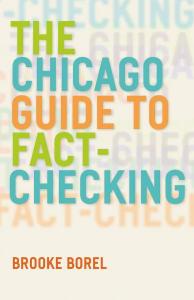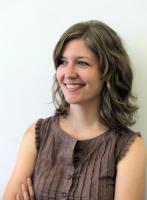Brooke Borel: The Chicago Guide to Fact-Checking
Brooke Borel
The University of Chicago Press, October 21, 2016,
$55 (hardcover), $17 (paperback), $9.99 (ebook)
ISBN: 9780226290768 (hardcover),
9780226290935 (paperback),
9780226291093 (e-book)
Borel reports:
I wish I could take credit for the idea behind The Chicago Guide to Fact-Checking, but I can’t. The book is the brainchild of Mary Laur, the editor at the University of Chicago Press who oversees writing reference guides. Chicago published my previous book, Infested: How the Bed Bug Infiltrated Our Bedrooms and Took Over the World (2015), and through a chance conversation, the publisher learned that I am a little obsessed with fact-checking.
Mary had been looking for an author for a fact-checking guide, but hadn’t found the right fit. My first journalism job was as a checker, and, at the time Mary heard about me, I’d just started teaching a local class at the Brooklyn Brainery on the art of the editorial fact-check, which regularly sells out to students who, for the most part, aren’t journalists despite the rather nerdy and esoteric topic! Mary invited me to submit a book proposal, and within a few months, I was working on the book.
Rather than making this Brooke Borel’s Guide to Fact-Checking, based only on my own experiences in the field, I wanted to approach the book journalistically. I put together a survey — not a scientific one, but helpful nonetheless — to get a sense of how journalists usually learn how to fact-check, whether they regularly work with checkers, and their overall opinions of the process. I got 234 responses. I also interviewed 90 people, including heads of research from publications such as the New Yorker and Vanity Fair, fact-checkers who are just starting out in the field, and checkers who have made a career working with radio programs, bestselling nonfiction authors, and more.The result is a how-to guide mixed with journalism history, philosophy, and a lay of the current landscape in media and fact-checking. My only regret is when I hear great fact-checking mishaps that I couldn’t include, because I learned about them too late. One example is the 1976 New York Magazine feature “Tribal Rites of the New Saturday Night,” which inspired the movie Saturday Night Fever. Twenty years after it was published, the author, Nik Cohn, admitted it was mostly a fabrication. What a gem!
Contact info:
- Brooke Borel: 646-389-0192, brookeborel@gmail.com, https://brookeborel.com/
- Publicist: Lauren Salas, 773-702-0890, lsalas@uchicago.edu
- Agent: Paul Lucas, 646-231-4238, plucas@janklow.com
- Book website: http://www.press.uchicago.edu/ucp/books/book/chicago/C/bo21182584.html
NASW members: will your book be published soon? Take advantage of this opportunity for shameless self-promotion. Submit your report for Advance Copy.
Tell your fellow NASW members how you came up with the idea for your book, developed a proposal, found an agent and publisher, funded and conducted research, and put the book together. Include what you wish you had known before you began working on your book, or had done differently.
See https://www.nasw.org/advance-copy-submission-guidelines.
Thinking of writing a book? If you are a NASW member, you may access a list of more than 150 books and online resources to help you craft your book proposal, find an agent and funding sources, negotiate your contract, learn about self-publishing, publicize and market your book, and more at https://www.nasw.org/article/write-book.
Send book info and questions about book publishing to Lynne Lamberg, NASW book editor, llamberg@nasw.org.


